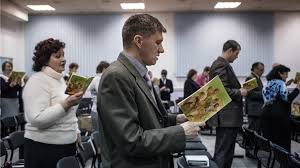Russia's Supreme Court has rejected a counter claim filed by Jehovah's Witnesses who are challenging a Justice Ministry order to cease operating in the country.

The religious organisation had asked the court to declare the government’s actions unlawful and recognise the group was facing political persecution, the Russian Legal Information Agency reported on Wednesday.
The court dismissed the claim, saying it did not have jurisdiction.
The US-founded Jehovah's Witnesses says it numbers about 8 million people worldwide and is known for its foreign ministries as well as its door-to-door campaigns.
But it has had problems with Russian authorities, who claim it is an “extremist” organisation.
Several of its publications have been placed on a list of banned extremist literature, and prosecutors have long cast it as an organisation that destroys families, fosters hatred and threatens lives, a description the organisation says is false.
According to Amnesty International, 16 members of the group in southern Russia were found guilty of organising and participating in a banned "extremist organisation" in late 2015.
A ban would directly affect around 400 of its groups and impact on all of its 2,277 religious groups in Russia which it said united 175,000 followers.

The religious organisation had asked the court to declare the government’s actions unlawful and recognise the group was facing political persecution, the Russian Legal Information Agency reported on Wednesday.
The court dismissed the claim, saying it did not have jurisdiction.
The US-founded Jehovah's Witnesses says it numbers about 8 million people worldwide and is known for its foreign ministries as well as its door-to-door campaigns.
But it has had problems with Russian authorities, who claim it is an “extremist” organisation.
Several of its publications have been placed on a list of banned extremist literature, and prosecutors have long cast it as an organisation that destroys families, fosters hatred and threatens lives, a description the organisation says is false.
According to Amnesty International, 16 members of the group in southern Russia were found guilty of organising and participating in a banned "extremist organisation" in late 2015.
A ban would directly affect around 400 of its groups and impact on all of its 2,277 religious groups in Russia which it said united 175,000 followers.

